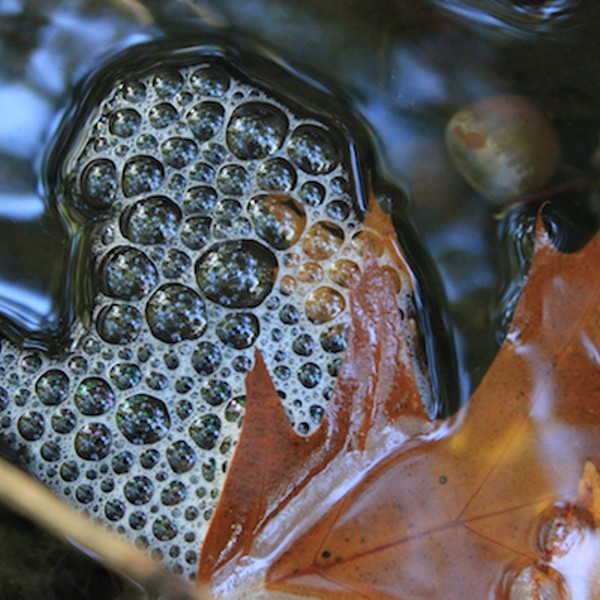
"We make a living by what we get, but we make a life by what we give." —Winston Churchill
Ask a parent how many times they've said to their kid, "Say thank you!" and they will be unable to tell you. Gratitude, it turns out, is not innate, yet a sense of entitlement is. And both the former and the latter are, arguably, essential in the modern world. Yet, while moms and dads want confident kids who feel deserving of life's pleasures, they don't want to release more ungrateful tyrants into society (well, most don't). How can parents offer crucial perspective to their young ones, a philosophy that shows a child's connectedness to his fellows and his specialness?
Diane Reeder, founder and executive director of the Queens Galley soup kitchen in Kingston, suggests volunteering as a household; bring the family to her establishment, or another charity, with donations of food, time, and/or money. Reeder sees plenty of families, including her own husband and three kids, ages 10, 18, and 24, roll up their sleeves as a unit, and the results are always good. "I've seen parents volunteer with their kids to keep them out of trouble," she says, smiling. "Or as a bonding experience. Or to show what the world is really like. It does usually change a kid's perspective."
Reeder came to service as someone who, at one time, found it hard to feed her family. "We struggled," she says, still shuddering at the memory. "We were both privileged and hungry—at one time we had $25 every two weeks to feed a family of five. I've been there, and people helped us. So, when we got back on our feet, I had my eldest stocking shelves at the St. Joseph's food pantry when she was four. Twenty years later, my two youngest have really taken to it."
The Queens Galley, which Reeder began in 2003, is an unusual soup kitchen, situated in a sunny, added-on section to a Victorian house that also serves as a homeless shelter (which Reeder manages). Reeder is a foodie, and she began this chapter of her life in service as a cooking teacher. "I taught women on food stamps how to cook, how to choose food, how to make a shopping list, how to navigate a grocery store, and how to save money," she says. This evolved into the Queens Galley.
Now, Reeder says, she "eats, breathes, and dreams" Queens Galley.
Volunteering as a Family Renowned for her creativity with food, she runs the place like a nice restaurant, with high-quality fare. On the day I visit, for instance, Kingston's hungry dine on pork loin with garlic and rosemary, whipped sweet potatoes, and crispy green beans, cooked up by a pro and served by volunteers. Two of those workers are SUNY Ulster nursing student Kathyrn Park and her 17-year-old son Evan Hoyt, a senior at Kingston High School. They've been volunteering once a week for about a year. In the steamy afternoon hubbub, mother is checking on folks, asking if anyone needs anything, while son is carrying a tub full of dirty dishes.
"Working here," says Hoyt, "made me realize I'm glad to have a roof over my head, and food. Before this, I'd never seen people who couldn't afford to buy food." Hoyt says his duties have included, among other things, cleaning tables, slicing bread, and peeling squash.
"He hardly washes dishes at home," Park says, laughing. "But here he's really helpful. I like to see him all sweaty and tired. We get sweaty and tired together. And it's good mother-son time. I want him to see that people need help, but also that he can help. This culture is so materialistic, people think they need things to feel good, but I want my son to know giving back can make you feel good, too."
"It's harder than I thought it would be," says Hoyt. "But it does feel good. I invited some friends once, and they never came back. It's work."
"I want Evan to do this with his own kids someday," Kathryn says. "I'm starting a tradition."
Giving Up to Give Back Kingston's Molly Sterrs, mother of a five-year-old, works at both the Queens Galley and Reeder's new sweet shop, Kingston Candy Bar. (Reeder, who receives no income from her charitable endeavors, laughingly calls Kingston Candy Bar "an attempt to support my nonprofit habit.") Sterr's father sat on the board of Kingston Hospital, and both parents involved her in charitable causes—mostly cancer-related—from the time she was very young. One way she passes along the "getting gratitude by giving back" concept to her son is by encouraging him to give up unused toys every six months. "Twice a year," she says, "he goes through his toy box and picks five to ten toys to give to Goodwill or a local Toys 4 Tots. He likes doing it."
Laurie Berrios, mother of three kids, aged 4, 10, and 13, also enlists her family to help in soup kitchens and various charitable causes, from hurricane relief to Kingston's Forsyth Nature Center. She met Reeder when, as part of Queens Galley's "second harvest" program, she and her kids collected unused bread from Panera in Kingston and delivered it to Reeder's chefs.
"Most things are caught, not taught," Berrios says. "My mom, whose life is all about volunteering, received social services for a while when I was kid, and she never wanted to be treated as 'lesser than.' So I was raised to respect everyone, to consider everyone's story, no matter what. With my own kids, my husband and I don't feel like we need to teach them that others are less fortunate. They know that. More importantly, we're conscious of them watching us being grateful to be in a position to help. We volunteer a lot, and we try not to complain about it, because crap runs downhill in our house."
Children Learn What They Live Sonja Maclary, pastor of Christ's Lutheran Church in Woodstock, and overseer of their Daily Bread soup kitchen, echoes Berrios's assertion of the gratitude-service loop. "If you feel thankful for what you've been given," she says, "you feel empowered to give back. It's good for children to recognize what their parents have done. The same is true of our maturity as human beings. We can show our gratitude by sharing it, and being a positive, loving influence in the world."
"My mom had a saying on the wall in my room when I was a little girl," Maclary says. "It was, 'Children learn what they live.'"
One of Diane Reeder's favorite aspects of running Queens Galley is when individuals, or families like her own, who availed themselves of help when they were in dire straits, return when they are flush to help, or to give donations of food or funds. She wells up when describing a frequent Queens Galley denizen who disappeared, then reappeared on a bike with an envelope of money for the soup kitchen. "I had to chase him down," she says. "He wanted to do it anonymously, but I was so moved by it I had to tell him. Times like that I really feel the joy and the satisfaction of what I do."














